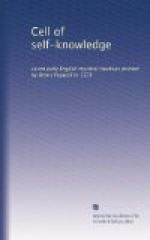Who so will not consent, but meeketh him truly to prayer and to counsel, shall graciously be delivered of all these deceits.[301] But it is sorrow for to say, and more for to feel, that sometime[302] our own spirit is so overcome peradventure with each of these three spirits, of the flesh, of the world, and of the fiend, and so brought into danger, bounden in bondage, in thraldom and in service of them all, that sorrow it is to wit. In great confusion and loss of itself, it doth now the office of each one of them itself in itself. And this befalleth when, after long use, and customable consenting unto them when they come, at the last it is made so fleshly, so worldly, and so malicious, so wicked, and so froward, that now plainly of itself, without suggestion of any other spirit, it gendereth and bringeth forth in itself, not only lusty thoughts of the flesh, and vain thoughts of the world, but that worst of all these, as are bitter thoughts and wicked, in backbiting and deeming, and evil suspicion of others. And when it is thus with our spirit, then, I trow, it may not lightly be known when it is our own spirit that speaketh, or when it heareth any of the other three spirits speaking in it as it is touched before. But what maketh it matter[303] who speaketh, when it is all one and the same thing that is spoken? What helpeth to know the person of him that speaketh, when it is siker and certain that all is evil and perilous that is spoken? If it be thine enemy, consent not to him, but meek thee to prayer and to counsel, and so mayst thou mightily withstand thine enemy. If it be thine own spirit, reprove him bitterly, and sighingly sorrow that ever thou fell in[304] so great wretchedness, bondage, and thraldom of the devil. Shrive thee of thy customed consents, and of thine old sins, and so mayst thou come (by grace) to recover thy freedom again; and by the gracious freedom mayst thou soon come to, wisely for to know, and soothfastly for to feel by the proof, when it is thine own spirit that speaketh these evils, or it be these other evil spirits that speaketh them in thee. And so may this knowing be a sovereign mean and help of againstanding, for often times unknowing is cause of much error, and, againward, knowing is cause of much truth; and to this manner of knowing mayst thou win thus as I say to thee.
If thou be in doubt or in were[305] of these evil thoughts when they come, whether that they be the speech of thine own spirit, or of any of the others of thine enemies; look then busily by the witness of thy counsel and thy conscience, if thou have been shriven and lawfully amended after the doom[306] of thy confessor, of all the consents that ever thou consented to that kind of sin, that thy thought is aware of. And if thou have not been shriven shrive thee then, as truly as thou mayst, by grace and by counsel; and then wete thou right well that all the thoughts that come to thee after thy shrift, stirring thee oft times




